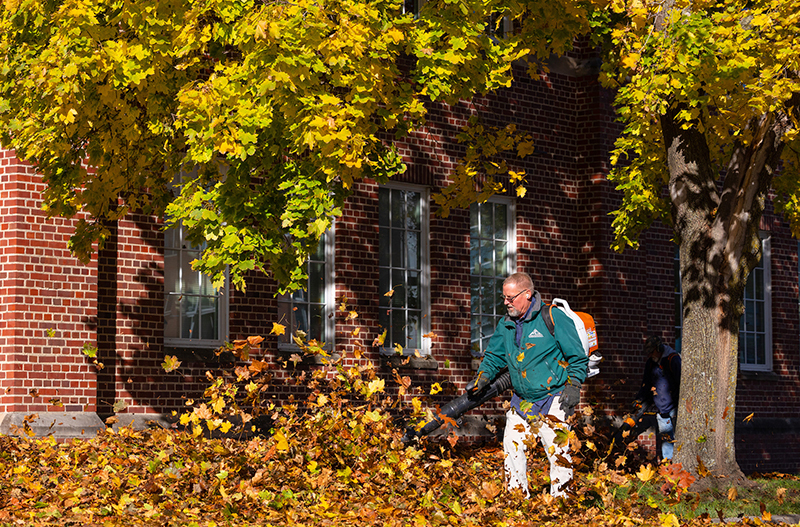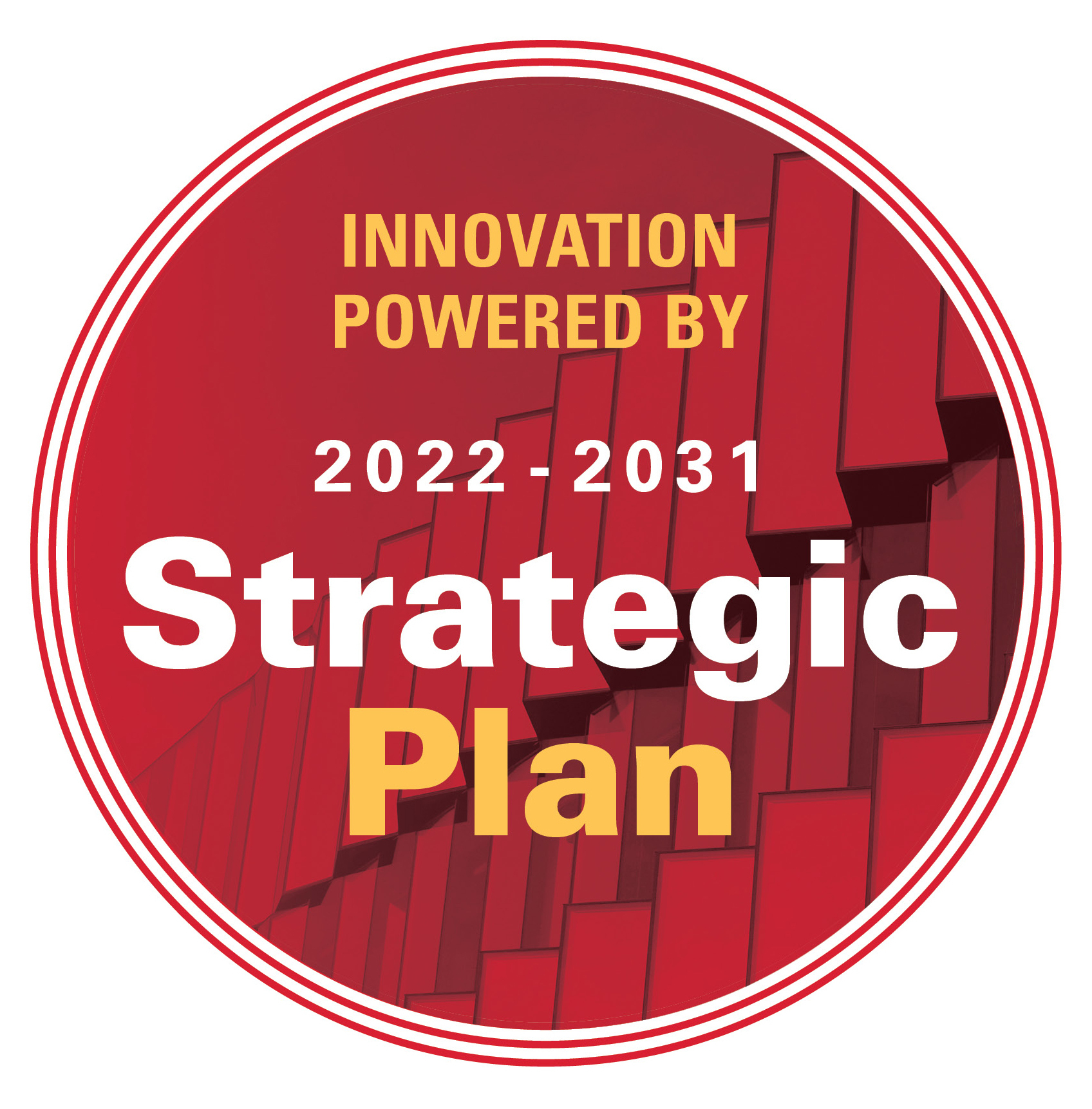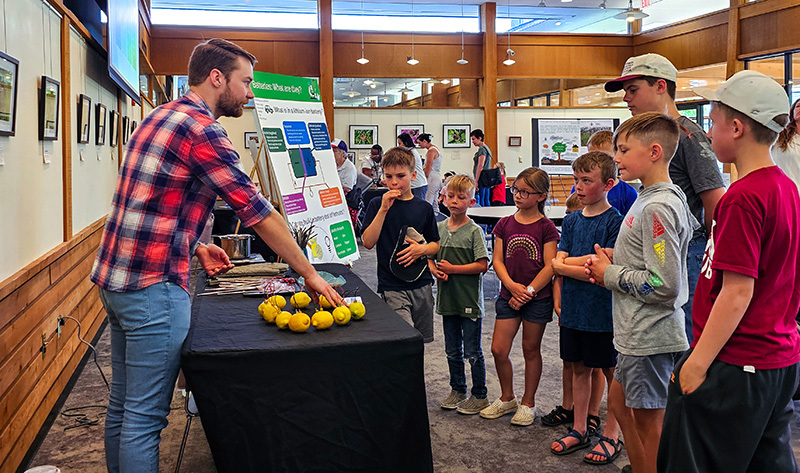Leaves above and below

Photo by Christopher Gannon.
It's that time of fall semester. Members of the campus services staff conduct a daily march to collect the blankets of fallen leaves around campus. (pictured) Groundskeeper Bob Adolph used a blower to organize colorful leaves outside the Armory Monday afternoon.
According to campus services senior manager Barb Steiner, nearly all the leaves that are scooped up get hauled to the university's compost facility near ISU's dairy farm south of Ames. Occasionally, she said, the strategy is to chop leaves a bit finer and use them on central campus as mulch for flower beds. For example, the new Perennial Movement Sample Garden south of the Hub in the Anderson Sculpture Garden will receive a two-inch layer of twice-chopped leaves once an estimated 5,000 perrenial bulbs are planted.
But with so many trees and so many leaves, they can't all be transported. Steiner said mulching decks on the riding mowers chop some leaves where they've fallen to add organic matter to the lawn areas and help retain soil moisture.
Degrees of the future, in the present
Faculty and academic leaders have been working for the last 18 months to create new academic programs -- Degrees of the Future -- that address student and workforce demands. Degrees of the Future is a three-year, $1.5 million initiative, funded by Iowa State's 2022-2031 strategic plan, to spur innovation in the curriculum. From 22 faculty proposals in 2023, six degrees were selected for development.

Ann Marie VanDerZanden, associate provost for academic programs and leader of the initiative, reports three of the six programs have crossed or reached the finish line. Two have been approved by the state Board of Regents:
- An online master's degree in digital health offered by the kinesiology department and delivered through Iowa State Online (another strategic plan investment).
- A bachelor's degree in game design led by the departments of community and regional planning and computer science.
A third program, a bachelor's degree in integrated health sciences led by the departments of genetics, development and cell biology and food science and human nutrition, is expected to be approved by the regents in the spring.
The remaining three degree programs funded through the strategic plan are making their way through department and college curriculum committees and are expected to be evaluated by the Faculty Senate during the spring semester:
- Bachelor's degree in digital storytelling, led by the Greenlee School of Journalism and Communication and music and theatre department.
- Master's of finance and technology (FinTech), led by the departments of finance and computer science.
- Bachelor's degree in precision agriculture, led by the departments of agronomy and agricultural and biosystems engineering.
One notable aspect is that three of the programs involve multiple colleges. Game design involves Design and Liberal Arts and Sciences (LAS); integrated health sciences includes LAS, Agriculture and Life Sciences, and Health and Human Sciences; and FinTech includes LAS and the Ivy College of Business.
While interdisciplinary programs typically take longer to route through the approval process, according to VanDerZanden, the final product can appeal to students across the entire range of a discipline.
"Our students are coming to campus looking for programs that leverage faculty expertise from multiple disciplines to best prepare them for professional success," she said. "We very much appreciate how colleges and departments have come together to create academic opportunities that will attract these students to Iowa State."
As programs are approved, faculty have begun creating courses to meet degree requirements, and colleges are working with the admissions team to market the degrees to prospective students.
Cyclone Civics initiative will touch students and employees
Iowa State students will have more opportunities to develop their civics knowledge and skills as part of a new universitywide initiative led by the College of Liberal Arts and Sciences (LAS). President Wendy Wintersteen announced the program -- Cyclone Civics -- at the state Board of Regents meeting on Nov. 7.
Cyclone Civics addresses the regents' 2023 directive 9 for each university to establish a "widespread initiative that includes opportunities for education and research on free speech and civic education."
Benjamin Withers, LAS college dean, leads the Cyclone Civics initiative with assistance from the Carrie Chapman Catt Center for Women and Politics. Catt Center director Karen Kedrowski is director of Cyclone Civics, and Kelly Shaw, teaching professor in political science, is associate director.
"The College of Liberal Arts and Sciences welcomes the opportunity to lead Cyclone Civics," Withers said. "With our diverse academic majors, interdisciplinary programs and innovative centers and institutes, the college is well prepared to equip faculty, students and staff with civics and free speech education, leadership and guidance."
Education on campus and beyond
Cyclone Civics has a three-pronged approach: education, research and outreach. The education component emphasizes curriculum instruction, forums, debates, lectures and other public events for students and the public. The research facet includes calls for proposals from faculty to support research on civic education, free speech and related areas. Keeping with its land-grant roots, the university will lean on expertise from ISU Extension and Outreach to spread civic education to all Iowans.
"The purpose of Cyclone Civics is to help faculty and staff across disciplines and across different functions be able to think about how they can incorporate civics into what they are teaching, whether it's in the classroom or outside the classroom," Kedrowski said.
Details evolving
While the broad brushstrokes of Cyclone Civics are evident, the details are still coming into focus. One of the first steps is to determine how well Iowa State students understand civics. The initiative's inaugural year will focus on assessing the civic literacy of university seniors through a survey that gauges awareness of the U.S. Constitution and other key civic knowledge areas.
"Current data indicates many college students, including those at Iowa State, lack a foundational understanding in these areas," Shaw said. "In the end, the initiative is designed to give students the skills and understanding needed to fill these critical gaps in knowledge."
Iowa State faculty and staff will be introduced to Cyclone Civics at a campuswide professional development conference on Feb. 19, 2025, aimed at integrating civics education across the Iowa State curriculum.
Also in the spring, the Cyclone Civics leadership team will begin to develop events and activities for the 2025-26 academic year focused on the 250th anniversary of American independence. These events will reflect upon the ideals of American democracy and delve into whether the United States is accomplishing those ideals or still working to fulfill them.
A civic culture
Through education, research and outreach, this program will weave civics into the fabric of the university, allowing students to discover and grow their own interests in civic engagement.
"We hope that we are creating a civic culture on campus, where across disciplines and across different parts of the university we are talking about civic responsibility and civic opportunities," Kedrowski said. "We want our students to understand that no matter what they are studying, they should be prepared to be active and engaged in the community in whatever way they choose."
Faculty and staff interested in collaborating on Cyclone Civics are welcome to join. Contact Kedrowski for more information.
Scientists: How do you talk about your work?

Jacob Wheaton (left), a Ph.D. student in materials science and engineering and member of the 2024 science communicators program, chats with a group about creating energy sources for all our technology. At the Reiman Gardens' "Meet a Scientist" event in May, he demonstrated using plants (lemons) and glass (melted candy) to find more sustainable ways to make batteries. Photo courtesy of Reiman Gardens.
Campus scientists who'd like to be better at sharing their research with non-academics -- K-12 students and teachers, farmers, local government leaders, nonprofit funders, for example -- might consider Reiman Gardens' science communication training program. It consists of monthly half-day sessions from January to May, individual mentoring in between and participation in two public science programs for "practice."
"This is about making science more accessible to the public by communicating more clearly about your work," said Sara Merritt, director of education at Reiman Gardens who leads the training. A second goal is to open more eyes to science careers.
NSF model
The training uses a National Science Foundation-funded model, "Portal to the Public." Sara Merritt and entomology assistant/project co-lead Anita Westphal were trained as science communication trainers at NSF grant-recipient Pacific Science Center, Seattle, in 2015. Reiman Gardens offered its first science communications training that year, and Merritt said it's refined a bit every year.
"Who's a scientist? Who can be a scientist? They're people like everyone else. That's what we want people to understand when they talk to a scientist," she said.
Any variety of Iowa State scientist in any field of science or engineering may enroll in the program: researchers, faculty, post docs and graduate students.
"They're the experts in their field. We're the experts at translating that and communicating with public audiences," Merritt said.
Training techniques include storytelling, gamification, inquiry as a teaching tool and other science education methods. Scientists are challenged to adapt a different vocabulary, adjust for the age group they're with and learn how to connect with their audience on a personal level. As part of the program, participants develop tabletop activities they can share with audiences to illustrate a concept from their work.
"Scientists' language gets more and more specialized every year they're in it," Merritt said. "We hope this program reminds them why they got into their field in the first place -- a curiosity about something -- and helps them convert that into a presentation that excites their audience," Merritt said.
Applications for the training program are due Nov. 30, and the program fee is $200, which may be paid with a department worktag. The program accepts up to a dozen scientists each year.
Micro-credential pilots are precursor to campuswide launch
An ISU micro-credential workgroup has spent the past several months building a foundation for the micro-credential program in preparation for a rollout in summer or fall 2025. Led by Center for Excellence in Learning and Teaching (CELT) professional development and micro-credential program specialist Tanya Austin, the workgroup established processes, standards for quality, centralized branding and technology for consistency across the university.
A major piece of the foundation is the micro-credential resources and support CELT staff developed for students, faculty and employers, including a comprehensive micro-credential toolkit to help faculty understand and design micro-credentials.
Want to learn more?
For more information about micro-credentials, email Tanya Austin.
"We are excited about the progress we've made since the announcement of micro-credentials in January," said Sara Marcketti, assistant provost and CELT executive director. "Based on months of research, collaborations with other institutions and internal faculty feedback, we are eager to share our initial procedures, which we will continue to adapt as the program evolves."
Procedures and guidelines
Micro-credentials are short, focused learning activities or programs that can last days or months. They allow students to gain and showcase specific skills or knowledge while earning their degrees. They also help the workforce add high-demand skills.
"Our goal with micro-credentials is to provide recognition for what our learners know and can do that directly aligns with workforce needs," Austin said. "These micro-credentials, especially when combined with a degree, ensure our learners are both broadly educated and highly skilled, preparing them for evolving workforce demands and recruiting practices."
After familiarizing themselves with the available resources, faculty and staff will be able to submit an initial interest form. CELT staff will then schedule a consultation to review criteria, offer guidance and support further development of the proposed program before seeking the workgroup's final approval.
Pilot programs
CELT is assisting several micro-credential pilot programs across various disciplines to track outcomes, interests and insights that will help improve processes. These pilots are laying the groundwork for a universitywide launch, Austin said.
"We are always looking for pilot programs," she said. "For established programs, it can be a fairly easy process to set up a micro-credential. I encourage faculty and staff to look at existing programming and experiences that could recognize students for demonstrating in-demand skills."
Two pilot programs have awarded their first badges. CYVAX, an ISU vaccine development laboratory in the ISU Research Park, had participants replicate what they learned during the training in a lab setting. The Translational AI Center -- focused on applying new technologies to work -- awarded a micro-credential in translational AI.
What's in a badge?
Upon completing an ISU micro-credential, learners receive a digital badge they can post on social media and use in job searches. To create brand recognition, the workgroup established a university-branded digital badge design that issuers will be provided as part of the consultation and approval process.
Micro-credential technology
ISU's micro-credential badges will be managed and awarded through the Accredible technology platform. Accredible acts as an administrative hub and an authentication tool for verifying digital badges and integrates with Canvas or can be used elsewhere. Implementation has begun with pilot programs transitioning over in the coming weeks.
Accredible has an easy, one-step process for accepting and storing digital badges as part of its seamless experience. It keeps learners engaged with built-in communication and marketing tools, recommendations for additional micro-credential opportunities and labor market insights aligned to newly acquired skills to assist career planning.
What's ahead for micro-credentials
Following the universitywide launch, Austin said the next priority is to explore for-credit micro-credentials.
"Offering micro-credentials for credit is a more complex undertaking that requires additional stakeholders, but it's essential for helping our learners progress toward traditional degrees," she said.
Creating university-level micro-credentials open to all students regardless of their program also is being considered. They could align with ISU's larger initiatives, such as entrepreneurship, artificial intelligence and broadly transferable skills.
Reeder discusses operations and finance structure with senators
Senior vice president of operations and finance Sean Reeder talked to senators about removing silos within the division he oversees during the Nov. 12 Faculty Senate meeting. The operations and finance division includes a range of units that serve students, faculty and staff, organized in several clusters:
- Finance
- Financial planning and analysis
- Facilities planning and management (FPM)
- Auxiliary units such as the ISU Book Store, Reiman Gardens, university museums, printing services, transportation services and Veenker golf course
- Real estate and capital planning
"I would like work to occur more collaboratively within my division, but also across the divisions that we support," he said. "I want to send a clear message that will provide consistency as we go forward with a customer-centric focus."
Reeder said FPM completed its first phase of a reorganization to create cross-functional teams that provide services to clients. It is a model he hopes to use across all operations and finance units.
Senators asked for more transparency about the increase in allocated costs across the university. They also urged Reeder to encourage communication between his units and those they serve whenever issues arise. Senators said it keeps small problems from becoming larger ones.
Other business
On other agenda items, senators:
- Approved a certificate program in risk management and insurance (PDF) for students from numerous majors and provide a deeper understanding of personal and corporate risk management and the insurance industry.
- Returned the certificate in real estate (PDF) proposal to the finance department in the Ivy College of Business for more discussion on its name. Some senators felt it was too broad.
Senators will vote at the December meeting on:
- Renaming the graduate specialization "Intelligent Infrastructure Engineering" to "Transdisciplinary Infrastructure Engineering" (PDF) in the civil, construction and environmental engineering department. The program will continue to offer specialization flexibility and cover four broad research areas; the new name offers new marketing and recruitment opportunities.
- Removing paraphrased language in the Faculty Handbook regarding consenting relationships and replacing it with a link to the consenting relationships policy in the policy library.
- Removing all but one section on intellectual property of educational materials from the Faculty Handbook and providing a link to the new institutional policy in the policy library. The remaining section in the handbook covers sending required reading and textbook information to the ISU Book Store, which is not covered in the new policy.
